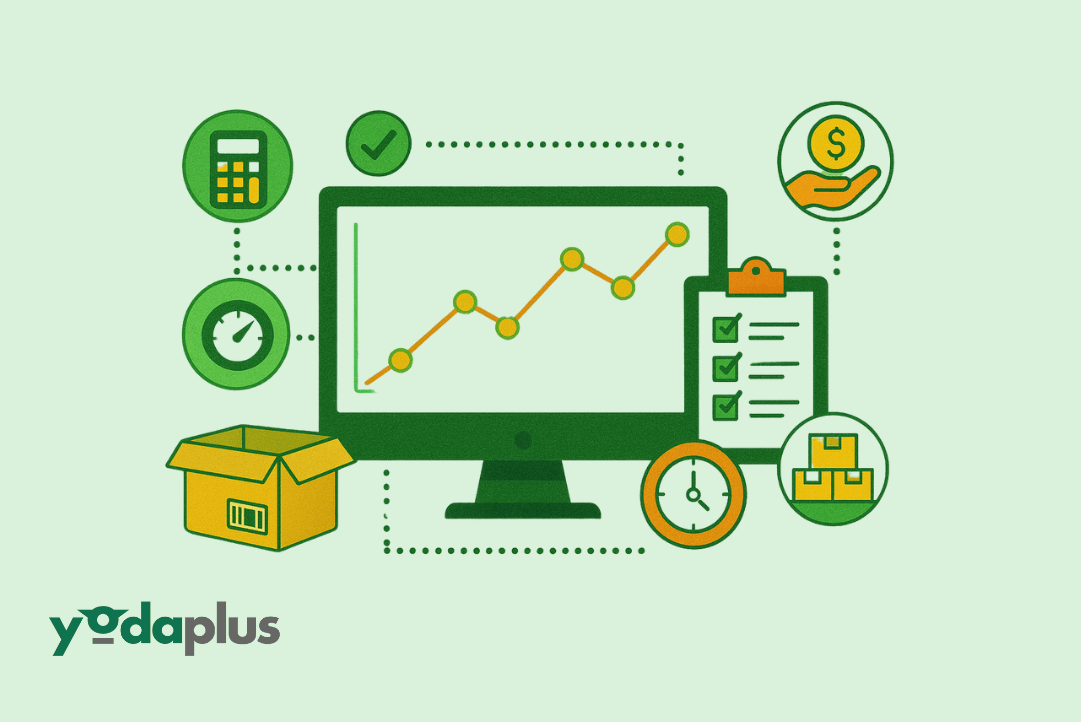
Beyond Inventory Turnover: New KPIs for Omnichannel Retail
August 21, 2025 By Yodaplus
Retail businesses have long used inventory turnover as a key performance indicator (KPI). While it is still valuable, the rise of omnichannel retail demands a broader view. Customers now shop through multiple channels, combining online and offline experiences. To stay competitive, businesses must track new KPIs that go beyond basic sales and stock movement. These KPIs align with retail technology solutions, supply chain technology, and modern inventory management systems that drive efficiency and customer satisfaction.
Why Traditional Inventory Turnover Is Not Enough
Inventory turnover measures how often stock is sold and replaced, but it does not capture the full customer journey. In omnichannel retail, shoppers expect speed, flexibility, and personalized options. Metrics tied only to stock movement overlook factors such as delivery performance, warehouse management system (WMS) efficiency, and supply chain optimization. Retailers now need data that blends inventory management solutions, retail inventory systems, and digital platforms to track performance more accurately.
New KPIs for Omnichannel Retail
1. Order Fulfillment Accuracy
Inaccurate orders can damage customer trust. Tracking order accuracy ensures that the right product reaches the right customer. This metric links directly to inventory optimization and the performance of a warehouse management system. High accuracy reduces returns, cuts costs, and strengthens brand loyalty.
2. Omnichannel Delivery Speed
Delivery time is a critical measure for supply chain technology. Customers expect fast shipping across multiple channels. By monitoring delivery speed, retailers can evaluate supply chain optimization efforts and adjust their retail technology solutions to remove delays in logistics.
3. Stock Availability Rate
Stockouts frustrate buyers and harm revenue. Measuring stock availability across channels is essential. A well-integrated inventory management system helps track real-time data to maintain ideal stock levels, ensuring consistent service through both physical stores and online platforms.
4. Customer Experience Index
Customer satisfaction is no longer about price alone. Tracking experience across touchpoints helps identify gaps in service. By combining data from retail inventory systems and ERP systems, businesses can measure how quickly issues are resolved, how personalized the service is, and how seamless the overall shopping experience feels.
5. Return Rate Analysis
Returns are common in omnichannel retail but should be managed carefully. Monitoring return rates helps retailers understand product quality, delivery accuracy, and overall customer satisfaction. Insights from custom ERP platforms can help reduce unnecessary returns while improving supply chain optimization.
6. Cross-Channel Sales Contribution
This KPI highlights how each channel contributes to total revenue. By evaluating sales across online marketplaces, mobile apps, and stores, businesses can refine their retail technology solutions. This insight allows managers to balance marketing spend and adjust inventory management solutions to support demand.
7. Sustainability Metrics
Sustainability is becoming a critical measure in modern supply chain technology. Tracking energy use, packaging waste, and logistics efficiency helps retailers stay compliant with global regulations. KPIs in this area link directly to both inventory optimization and supply chain optimization, making sustainability part of performance goals.
Role of Technology in Measuring KPIs
The shift to new KPIs is powered by digital innovation. Retail technology solutions provide dashboards and analytics that combine sales, stock, and customer data in one place. Inventory management systems integrate with warehouse management systems to improve accuracy and speed. Meanwhile, supply chain technology ensures end-to-end visibility for better planning and forecasting.
By using custom ERP and connected platforms, businesses can track all the KPIs mentioned above. These technologies help retailers respond to changes in demand, maintain retail inventory systems, and optimize every layer of their supply chain technology.
Conclusion
In omnichannel retail, relying only on inventory turnover is no longer enough. Modern businesses must adopt new KPIs that reflect delivery accuracy, stock availability, customer experience, and sustainability. These metrics depend on strong inventory management solutions, warehouse management systems, and supply chain optimization.
Retailers that embrace new performance measures will be able to build better customer experiences, maintain efficient supply chain technology, and make data-driven decisions that set them apart in a competitive market. With Supply Chain and Retail Solutions from Yodaplus, businesses can integrate advanced tools to optimize operations, improve visibility, and stay ahead in the evolving retail landscape.